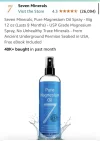The medical literature is pretty clear that the best treatment for chronic insomnia is cognitive behavioral therapy. It blows away any drugs. Of course, this is a special circumstance, but it's something we should always keep in mind when discussing sleep.
Trazodone is very much a YMMV drug. Some people take it at a dose prescribed for sleep and feel very little. Others feel drugged immediately with a hangover lasting well into the next day. It can cause swelling in the nasal passage, so that you can't breathe through your nose, which can interfere with sleep. Others have vivid nightmares -- I can only imagine mixing Tren dreams with trazodone nightmares. Finally, it can cause priapism in rare instances, so you gotta go to the ER with a raging boner or risk permanent wang damage. (Treatment often involves needles.)
The bad news about medical therapies is that there are very few that work over the long term, and they all have really shitty side effects. The good news is, there's a ton of them that will probably be effective and safe(ish) over the duration of a tren cycle.
The most obvious option is diphenhydramine (Benadryl in the US). It's an anti-histamine that causes drowsiness in most people. If you take too much, there's a paradoxical reversal that causes hyperactivity and something that feels like whole-body restless legs. Still, it's readily available and very cheap. Over the course of a few weeks, you'll build some tolerance but not a ton, and you'll avoid the main negative side effect of long-term use, which is dementia. It can cause a sleep hangover into the next day, so try to find the minimum effective dose, starting with a single 25 mg tablet and working up in half-tablet increments.
Along with trazodone, there are a few anti-depressants that can be taken at a lower dose to aid sleep. These are mirtazapine, nortriptyline, and amitriptyline. As far as evidence goes, another cyclic antidepressant has the best evidence as a sleep drug, which is doxepin. Trazodone remains more popular as a sleep drug (I don't know why), but the others have been used with success. My two cents: even though the dosing is lower, I would be reluctant to take anything likely to alter affect while already taking tren. I'd also be reluctant to hop on and off such medications as you cycle. If you're going to try anything, ask for doxepin. But the experiment hasn't been done and there's no data, so who the hell knows?
There's a forest of benzodiazepines, and short-term use may obviate the rapid tolerance problem. However, I'd stay away pretty much entirely. The potential for addiction is real, and the *common* side-effects include memory loss and atypical behavior. That's not something I want to stack with tren.
The non-benzo hypnotics are similar but vary pretty widely. Zolpidem (Ambien in the US) is highly effective, but builds up tolerance quickly and is associated with the worst side-effect profile. Along with the side effects of the benzos, it also includes complex somnolence... hardcore sleep walking that can have you cooking food, having sex, or even gambling while being blacked out. Of this bunch, there is only one drug that has been studied for safety and efficacy over a long term period (six months), and that is eszopiclone (Lunesta in the US). It has a milder side effect profile, but also provides milder sedation. Still, if one is going to try a hypnotic sleep aid, starting here is the move. Again -- take as little as possible and titrate up until you find a dose that works.
There's a zoo of off-label medicines that are prescribed for sleep. There's a handful of anti-psychotics (quetiapine, risperidone) but they have a heavy side-effect burden; I would try these as a last resort. Orexin (Belsomra) exists but sucks ass, empirically. Clonidine is an interesting one, in that it has the effect of lowering blood pressure, which most of us could use, but also causes muscular weakness and a dangerous dependence. Gabapentin and pregabalin are both effective at promoting sleep, especially if you have restless legs. Unfortunately, they're also being sought out as recreational drugs now, so you may have trouble finding a doctor who wants to write them. Hydroxyzine is an old anti-histamine that works for some people; sort of like Benadryl's older brother. Worth trying for just a few weeks if that's what is available.
I have sleep problems and when all of the sleep hygiene and cognitive behavioral therapy tools fail, I take eszopiclone (Lunesta). The medical literature considers it safe and effective for long-term use, doesn't make a sleepwalking sex addict, and won't contribute to dementia. It's got its downsides in terms of sleep architecture, but it's better than lying awake for hours. Everyone's mileage will vary, especially for a couple of weeks, but as a regular part of my life, it seems like the best option for me.


